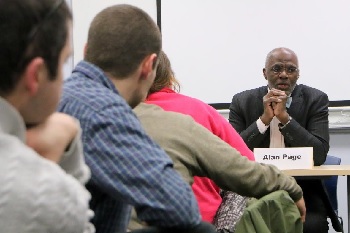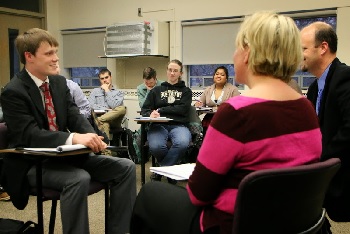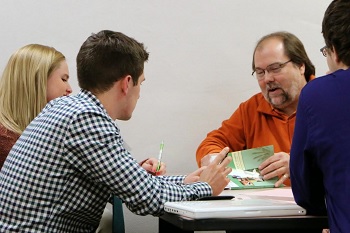Have you ever wondered what you might learn in an M.Ed. course or what your classroom experiences might be like? During the course “Reflecting on Professional Development in Social Studies Education” (CI 5744), three Curriculum and Instruction students, Robert Lewis, Alex Hertogs, and Mary Dierkes, were gracious enough to highlight some of their favorite moments for us.
 “On February 27, Dr. Todd Beach convened a panel for our class to discuss the topic of understanding social class differences in the classroom. In the front of the room, the speakers included two representatives from Eastview High School: Julian Hines, student services facilitator; and Kim Martinson, assistant principal for ninth grade and special education. Also speaking was the Honorable Alan Page, an associate justice of the Minnesota Supreme Court and a member of both the College Football Hall of Fame and the Pro Football Hall of Fame.
“On February 27, Dr. Todd Beach convened a panel for our class to discuss the topic of understanding social class differences in the classroom. In the front of the room, the speakers included two representatives from Eastview High School: Julian Hines, student services facilitator; and Kim Martinson, assistant principal for ninth grade and special education. Also speaking was the Honorable Alan Page, an associate justice of the Minnesota Supreme Court and a member of both the College Football Hall of Fame and the Pro Football Hall of Fame.
“A major theme in this discussion centered on acknowledging how some students, particularly students of color, have a markedly different experience within the school system than others. The panel responded by advising teachers to be conscious of how perception can play a role in this problem. A particularly powerful moment in the discussion was a contribution by Justice Page, where he highlighted the ‘weight of responsibility that rests on our shoulders as educators [of the next generation].’ Page described how planners use test scores for a generation of students as young as middle school as an indicator for how many prisons need to be built. This discussion was an important one to have and a topic that needs to continue to be discussed among educators.”
– Robert Lewis, M.Ed. social studies teacher candidate
 “On April 3, two mock interviews took place. Two students from the class were interviewed by administrators from Eastview High School for 30 minutes while the remainder of the class watched and took notes in preparation of a discussion, which immediately followed each interview. Many of my colleagues stated that they thought it was the most beneficial class session they had attended thus far. They felt as though they had gained valuable insight into the minds of administrators and hiring managers, which in turn had given them the confidence to prepare for their own future interviews. As one of the interviewees, I found the exercise very helpful. Not only was the atmosphere set in such a way as to create a comfortable environment, but the interviewers were excellent, and the feedback that I received was invaluable…so invaluable, in fact, that it fully prepared me for the Minnesota Job Fair the following week, in which I was offered a position after a 15-minute interview.”
“On April 3, two mock interviews took place. Two students from the class were interviewed by administrators from Eastview High School for 30 minutes while the remainder of the class watched and took notes in preparation of a discussion, which immediately followed each interview. Many of my colleagues stated that they thought it was the most beneficial class session they had attended thus far. They felt as though they had gained valuable insight into the minds of administrators and hiring managers, which in turn had given them the confidence to prepare for their own future interviews. As one of the interviewees, I found the exercise very helpful. Not only was the atmosphere set in such a way as to create a comfortable environment, but the interviewers were excellent, and the feedback that I received was invaluable…so invaluable, in fact, that it fully prepared me for the Minnesota Job Fair the following week, in which I was offered a position after a 15-minute interview.”
– Alex Hertogs, M.Ed. social studies teacher candidate
 “Dr. Todd Beach brought together a panel of former and current educators from around the Twin Cities to discuss grading and assessment in secondary social studies classrooms. Breaking into smaller groups, the panelists and graduate students were given the chance to talk through different classroom scenarios, share ideas, and talk about the difficulties teachers face when contemplating assessments of students’ work and effort.
“Dr. Todd Beach brought together a panel of former and current educators from around the Twin Cities to discuss grading and assessment in secondary social studies classrooms. Breaking into smaller groups, the panelists and graduate students were given the chance to talk through different classroom scenarios, share ideas, and talk about the difficulties teachers face when contemplating assessments of students’ work and effort.
“Grading is one of the aspects of teaching that is often overlooked and is something that the field of education might assume that people just ‘know how to do.’ However, in practice, there are many factors that can affect the way in which grading can play out in the classroom and with students and parents. In smaller groups, the veteran teachers gave students insight into how they calculated grades as well as how they approached some of the more tough scenarios, such as students who do not exhibit any effort yet seem to score well, and conversely, students who put in a great deal of effort yet cannot achieve passing scores. This was very useful to the teacher candidates, for it is practical to their everyday lives and allows a space to answer questions that often get overlooked or go unconsidered.”
– Mary Dierkes, M.Ed. social studies teacher candidate
To learn more about our M.Ed. initial licensure programs, including the social studies education M.Ed., please visit our program pages.



